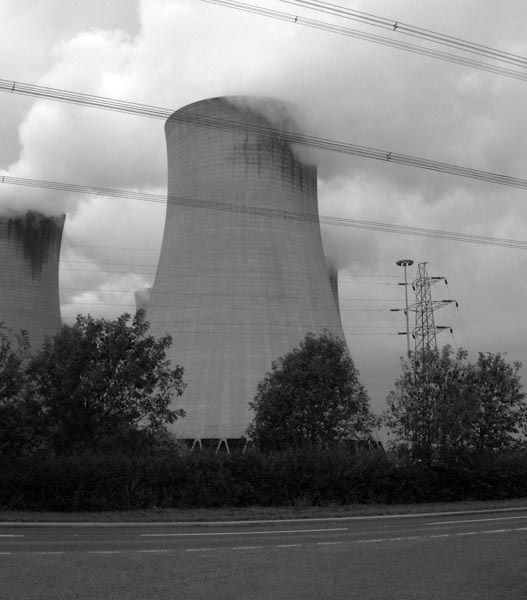Blackouts from Brussels
WORKERS, JULY 2008 ISSUE

|
|
Drax power station, Yorkshire
Photo: Workers |
The blackouts that plunged 500,000 homes into darkness in May were compounded by European environmental restrictions over the use of coal– and oil–fired power stations. The unexpected shutdown of two power stations earlier this summer led to the worst disruption to the UK's power network in more than 20 years, prompting new concerns over the stability of Britain's ageing power grid.
But industry sources say that a key factor was the European Union's Large Combustion Plant Directive (LCPD), which sets strict limits on the number of hours that some of Britain's largest and more heavily polluting coal– and oil–fired power stations can operate before they have to close in 2015. For power stations that have more than one burner, this has created an economic incentive for plants to be switched off unless they are being operated at full capacity, or until wholesale power prices increase enough for them to be turned back on.
Power industry managers said that the rules had contributed to mounting instability on the network because increasing numbers of power stations were not being run at any one time, reducing the margin of spare capacity and the ability of the National Grid to boost supply rapidly at times of crisis.
The problem has been made worse because it affects coal– and oil–fired stations, two of the most flexible sources of power generation. While nuclear plants need plenty of time to boost their power output, operational oil– and coal–fired stations can be fired up quickly to generate more energy.
This is yet another example of an EU dictat being against the needs and interests of the British people. National sovereignty is not a theoretical issue for workers – it affects the very basis of our lives.
The independent House of Commons Library is predicting that by 2056 there will be an extra 17 million people here, taking the total to 67.9 million. More births, people living longer and, more significantly, continued mass immigration will fuel the unprecedented growth in numbers.
Research by Karen Dunnell, the National Statistician, revealed the huge role immigration plays in UK–wide population growth, as compared with birth and death rates. Net migration – the amount immigration adds to the population after subtracting emigration – is running at 190,000 a year. But Mrs Dunnell's research shows that, until Labour came to power, 'natural change' – people living longer or having more children – was the main reason for Britain becoming more crowded.
Between 1992 and 1996, when the Tories were in power, natural change added 582,604 to the population of the UK. Net migration and other factors, such as the number of Forces personnel living in the UK, added only 143,112.
But, between 1997 and 2001, a huge change took place as the new Labour government adopted an 'open door' immigration policy. Natural change added 416,471 to the population, migration 532,652. From 2002 to 2006, it was even more dramatic, with natural change adding 528,429, and net migration 932,999.
MPs on the Treasury select committee said that the International Passenger Survey – which plays a central role in estimating international migration – is 'not fit for purpose'. It surveys only a small number of travellers and, in the past, some ports were not even covered. MPs also say short–term migrants are being excluded from official figures, leaving local councils short of funding.
Committee chairman Michael Fallon said, "Reliable population estimates are fundamental for allocation of funding for public services. Our democracy is dependent on accurate, independent statistics. ... It is now impossible to estimate accurately the UK population today. Unreliable statistics make planning impossible. We call on the Government to improve the population count as a matter of urgency."